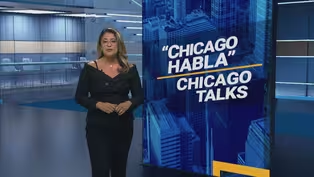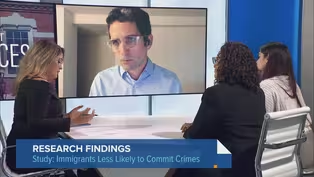Chicago Tonight: Latino Voices
New Report Highlights History, Challenges for Mexicans in Chicago
Clip: 9/19/2024 | 8m 10sVideo has Closed Captions
One in five Chicagoans are considered Mexican.
Despite the demographic being in Chicago since the 1950s, only one report has dug into the history of Chicanos in the city.
Problems playing video? | Closed Captioning Feedback
Problems playing video? | Closed Captioning Feedback
Chicago Tonight: Latino Voices is a local public television program presented by WTTW
Chicago Tonight: Latino Voices
New Report Highlights History, Challenges for Mexicans in Chicago
Clip: 9/19/2024 | 8m 10sVideo has Closed Captions
Despite the demographic being in Chicago since the 1950s, only one report has dug into the history of Chicanos in the city.
Problems playing video? | Closed Captioning Feedback
How to Watch Chicago Tonight: Latino Voices
Chicago Tonight: Latino Voices is available to stream on pbs.org and the free PBS App, available on iPhone, Apple TV, Android TV, Android smartphones, Amazon Fire TV, Amazon Fire Tablet, Roku, Samsung Smart TV, and Vizio.
Providing Support for PBS.org
Learn Moreabout PBS online sponsorship>> One in 5 Chicagoans have Mexican heritage.
But despite being a part of Chicago's since 1950's, there hasn't been a major academic study on their history and impact on the Windy City.
A new report released just in time for Hispanic Heritage Month aims to fix that.
Here to talk more about their findings are Luis with the founder and CEO of Latinos Broken a sandal Hoese family else, executive director and CEO of that Gas and North Bay ending that both the little president and CEO of Morehead is letting us in action.
Thank you all for joining us is and and I seen you guys again.
Great to see you.
anything.
please.
I want to start with you.
What was the inspiration behind pursuing the study?
>> Well, you know, the next in communities and large communities to Chicago.
And one of the things that we realized when we came together is that there was not a lot of information on who we are.
And so as we start to do work in our city, creating program me thinking about policies, was really important to create a baseline.
So we know where we are and where we want to go.
>> And Jose, what was the process like on collecting the state?
Okay.
Take me down through that journey.
>> Well, I mean, first that took a lot of his beating and bring sermon vote we really wanted to do because I mean, there's just so much information that's missing going be right.
of total.
says they want to spearhead getting us together.
But just coming up with a deal, what kind of data we wanted to collect.
Now, the most surprising thing was when we started collecting data and UNC started working on the problem, this project wasn't there just was not enough information to capture everything that we wanted to share, especially knowing you know, the settlers, the first Mexican sellers have been here since the 50's.
>> We want to go to you.
What are some of would you say?
The consequence, the risk of not having comprehensive comprehensive data available like this.
>> When it comes to making decisions on policy?
>> Well, I think for us it's really critically important is to make sure that we're thinking about this particular needs of ethnic groups and national origin groups within the just desperate here in Chicago.
So that's important.
think the other thing, too, is that we have to make sure that we are asking me what they want, but also doing research specific to them.
So one of the highlights of our approach doing this was doing focus groups.
We did.
Several focus groups asking community members.
What did they want to see in terms of committee growth?
But also what are the challenges with regards to identity leadership, health, education, economic development.
And that to us is really important to get that kind firsthand knowledge in a Identity is a big one.
I want to go back to the start of the report because it stood out addressing the problems in the hit TV series.
The Bear.
>> Which features know Mexican lead when according to the U.S. Census, about 44% of all cooks in Chicago are of Mexican origin.
Luis Y was an important to include this.
>> Well, I think in general, one of the things that we're seeing is that there's not a lot of representation that Mexico of Mexicans on a lot of levels.
So when you look whether it's government for land be nonprofit sector or, you know, media TV movies, you don't really see representation of the community sort report like this is extremely important because it gets the conversation started.
Now we can sit down and actually look at data and then look at the field and say does our population and our economic contribution match the positions that were being put in.
>> were your thoughts when you started watching the very real, as I think there's only like Mexicans in the credits are in the beginning credits.
>> I for me, it's more about the fact that again, you know, we are as councils and built Chicago continue to build this city can believe it or they're all over the country.
We have Congressman, we have we folks in Indian high levels of government, not enough, but we do have a lot of folks and our our leaders yet.
When you look at TV were not represented there, when you look at how funding is distributed among different communities and kind continue to lag behind.
So when is so so that's why it was important to tell his story and really take a focus.
Look and with whom he condos are.
And the fact that we've been here for hundreds.
so what actually shared with mean interest event.
told me it and they reminded me that anywhere you see corn, kind of state had a presence.
And you think about what some of the major experts is here for the staff or the state of Illinois part, you know, so we've been here much longer than people give us credit its really interesting that during the study or focus group covered health.
>> And the suburbs of data shows that two-thirds of Mexicans now live outside the city.
Can you explain the migration pattern and what were some of the notable observations you made from the suburban communities?
That's a great questions.
So the first thing is like the rest, United States, we have a housing crisis.
And so.
>> Our Mexican committee members, they're looking at affordable housing options.
Homeownership is incredibly attractive.
We have higher rates of home ownership than we even knew.
And it's hard to own in Chicago.
And so living in the suburbs is very attractive.
The other thing shone through the data that was we have higher household 4.3 in terms of our size.
And so we have multiple generations living together into the suburbs offers that option.
But the other thing we have to note is that the more recent immigrant, migration of McConnell's here in in the area, they're going directly to the suburbs are not stopping in the city anymore.
And as historical neighborhoods like Little Village and Pilsen become more expensive, they're moving southwest and then moving into the suburbs.
It's really interesting.
I mean, why my parents migrated here?
They went straight to Rogers Park or likes.
We know little pilsen and in the city.
>> Luis also from the study, we also saw the Mexicans make up 20% of Chicago's population and 70% of the Chicago's Latino population.
But it's still difficult for Mexicans to obtain a business loan or a home loan.
Why do you think that is?
>> Well, I think that, you know, when you start to look at the numbers, one in 5 people identify as being Mexican.
And so when we look at the resources that are coming into our community, whether it be a home loan, business loan and, you know, Mexicans are entrepreneur.
And so we want open businesses.
They're just have not been loans and resources that are offered directly to the community and better explain to them in a way that the understand it.
There are some loans and some things that are available for a community a lot of times our community doesn't trust what is coming.
And so, you know, we have to prepare information, cultural, sensitive way and those things are important.
>> will you say now moving forward that you want people to take away from this report?
I want people look at this report.
Look at that data.
Look at the information and know that.
>> You know, we he kind here and we are a very large population.
We very young.
So we're going to invest in any kind investment he kind of citizen investment in the city of Chicago in the future of our entire region.
>> And then the world would just share some of the policy recommendations that you want.
People here.
I think first of all, we need to collect national Think data from government organizations and not-for-profits that receive this information.
There are differences among the ethnic groups and not just with the left in a Jasper but other groups as well.
That's the first one.
I think the other one is that we have to make sure that we are encouraging the development educational attainment in our community.
One of the data points it was very shocking.
Is that Mexican students and CPS go to school every day, they have great attendance, but they are not having high performance.
We need to dig more deeply to that.
Why is that happening?
What is needed to provide the right wraparound supports percent of students.
86 1%.
6 of Mexican kids go to CPS in Chicago.
And so that's something that is really shocking when we know Education's our pathway to success.
And Lee is what is the goal now to get this information out?
So the goal right now is to talk to as many people as possible.
We've created this site, Mexican Chicago DOT org encourage everybody to go there.
>> Take a look at the report downloaded have conversations with your family.
Your friends have the conversations that work feel free invite us to come out and talk to people.
We need to talk and this is the first step in a long line of what needs to happen next couple years.
have a couple seconds.
So want to go around the room and just one word to
Chicago Talks: What Latino Person Has Inspired You?
Video has Closed Captions
Clip: 9/19/2024 | 2m 30s | Chicagoans are celebrating Hispanic Heritage Month. (2m 30s)
Is Migrant Crime Actually on the Rise? What Data Shows
Video has Closed Captions
Clip: 9/19/2024 | 8m 56s | Claims of an immigrant crime wave have been a major talking point this election cycle. (8m 56s)
Providing Support for PBS.org
Learn Moreabout PBS online sponsorship
- News and Public Affairs

Top journalists deliver compelling original analysis of the hour's headlines.

- News and Public Affairs

FRONTLINE is investigative journalism that questions, explains and changes our world.












Support for PBS provided by:
Chicago Tonight: Latino Voices is a local public television program presented by WTTW

